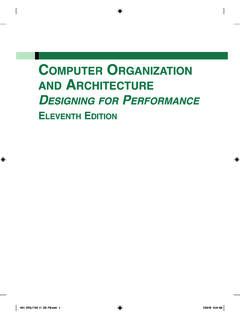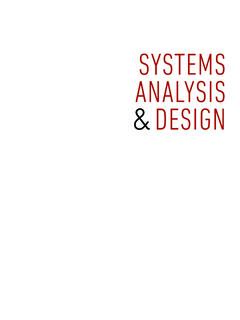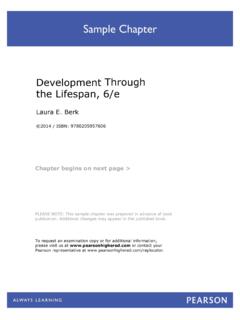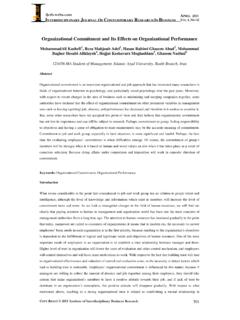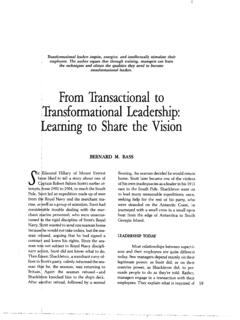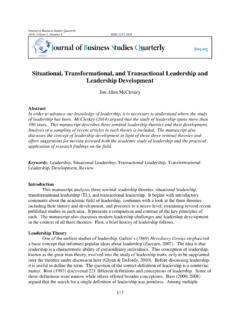Transcription of Emotions and Moods - Pearson
1 Emotionsand MoodsLEARNING OBJECTIVESA fter reading this chapter, you should be able to:Reason is, and ought only to be the slave of the passions,and can never pretend to any other office than to serveand obey them. David Hume5 Discuss the impact emotional laborhas on the case for and the caseagainst emotional concepts on Emotions andmoods to OB Emotions from the different aspects the sources of Emotions external constraints 12/15/05 12:25 PM Page 258 CHAPTERon the grounds of his flagship hotel andcasino, The Mirage. At the same time,while Wynn was in charge of theMirage, it was high on Fortune slist of America s Most , in contrast to Wynn s volatile person-ality, his new hotel is meant to appeal to peo-ple s desire for calm-ness.
2 Gone are the exotic public displays,such as volcanoes and caged tigers, thatgraced his earlier hotels. He even says that he d get rid of the casinos if he could. No casinos in a Las Vegas hotel? Could Steve Wynnbe bluffing? Steve Wynn, the famous hotelmogul, is an emotional is known for his infectiousenthusiasm, as well as his temper. He onceshot off his index finger in his office. Andwhen describing his new $ billion hotel,which he named after himself, he brokeinto a song from a musical.
3 When have youever seen a CEO do that? Wynn s also givento making outlandish statements. He saidof his new hotel, This building is morecomplex than any other structure in thehistory of the world. He also once com-mented, smiling, that Las Vegas is sort oflike how God would do it if he had money. Many regard Wynn as the most power-ful man in Nevada, largely because he canboth inspire and scare people. One politi-cian stated, Steve Wynn s control overpoliticians is all-encompassing. It s over-whelming. Either you work for him or hetries to get you out of office.
4 Those who know Wynn say his tempercan erupt as fiercely as the volcano he putEmotions Can Be 12/15/05 12:25 PM Page 259260 PART TWOThe IndividualIt s probably safe to assume that most of us are not as given to emotionalextremes as Steve Wynn. If we were, could we be as successful as he in ourprofessions? Given the obvious role that Emotions play in our work andeveryday lives, it might surprise you to learn that, until recently, the field of OBhas given the topic of Emotions little or no could this be? Wecan offer two possible first is the myth of the late nineteenth century and therise of scientific management, the protocol of the work world has been to keepa damper on Emotions .
5 A well-run organization was one that didn t allowemployees to express frustration, fear, anger, love, hate, joy, grief, and similarfeelings. The prevailing thought was that such Emotions were the antithesis ofrationality. Even though researchers and managers knew that Emotions were aninseparable part of everyday life, they tried to create organizations that wereemotion-free. That, of course, wasn t second explanation was the belief that Emotions of any kind are researchers considered Emotions , they looked at strong, nega-tive Emotions especially anger that interfered with an employee s ability towork effectively.
6 They rarely viewed Emotions as constructive or able toenhance some Emotions , particularly when exhibited at the wrong time,can reduce employee performance. But this doesn t change the fact thatemployees bring their emotional sides with them to work every day and that nostudy of OB could be comprehensive without considering the role of emotionsin workplace Are Emotions and Moods ?Although we don t want to obsess over definitions, before we can proceed withour analysis, we need to clarify three terms that are closely intertwined: affect, Emotions , and a generic term that covers a broad range of feelings that peopleexperience.
7 It s an umbrella concept that encompasses both Emotions intense feelings that are directed at someone or feelings that tend to be less intense than Emotions and thatoften (though not always) lack a contextual experts believe that Emotions are more fleeting than , if someone is rude to you, you ll feel angry. That intense feeling ofanger probably comes and goes fairly quickly, maybe even in a matter of sec-onds. When you re in a bad mood, though, you can feel bad for several are reactions to a person (seeing a friend at work may make you feelglad) or event (dealing with a rude client may make you feel angry).
8 You showyour Emotions when you re happy about something, angry at someone, afraid ofsomething. 9 Moods , in contrast, aren t usually directed at a person or event. Butemotions can turn into Moods when you lose focus on the event or object thatstarted the feeling. And, by the same token, good or bad Moods can make youmore emotional in response to an event. So when a colleague criticizes how youspoke to a client, you might become angry at him. That is, you show emotion(anger) toward a specific object (your colleague). But as the specific emotion dis-sipates, you might just feel generally dispirited.
9 You can t attribute this feeling toany single event; you re just not your normal self. You might then overreact toother events. This affect state describes a mood. Exhibit 8-1 shows the relation-ships among affect, Emotions , and , as the exhibit shows, affect is a broad term that encompasses emotionsand Moods . Second, there are differences between Emotions and Moods . 12/15/05 12:25 PM Page 260 CHAPTER 8 Emotions and Moods261of these differences that Emotions are more likely to be caused by a specificevent, and Emotions are more fleeting than Moods we just discussed.
10 Otherdifferences are subtler. For example, unlike Moods , Emotions tend to be moreclearly revealed with facial expressions (anger, disgust). Also, some researchersspeculate that Emotions may be more action-oriented they may lead us tosome immediate action while Moods may be more cognitive, meaning theymay cause us to think or brood for a , the exhibit shows that Emotions and Moods can mutually influenceeach other. For example, an emotion, if it s strong and deep enough, can turninto a mood: Getting your dream job may generate the emotion of joy, but italso can put you in a good mood for several days.

